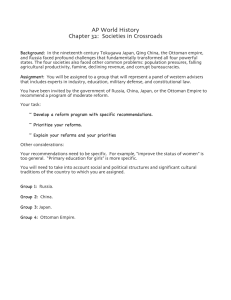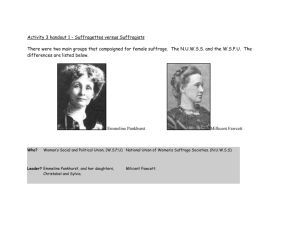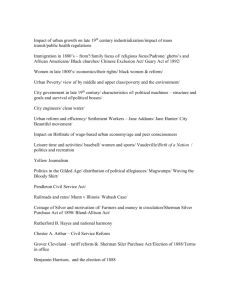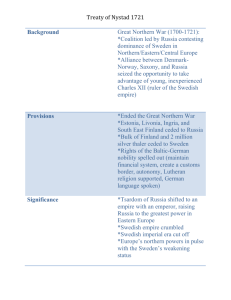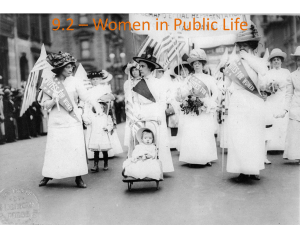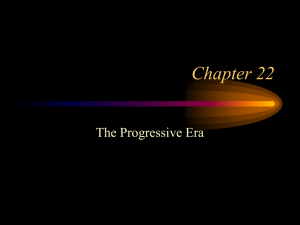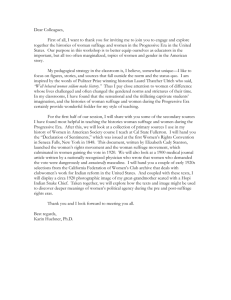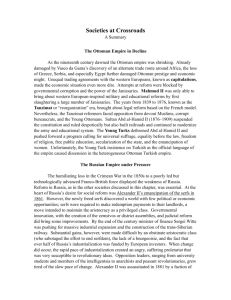Mass Politics - Kenston Local Schools
advertisement
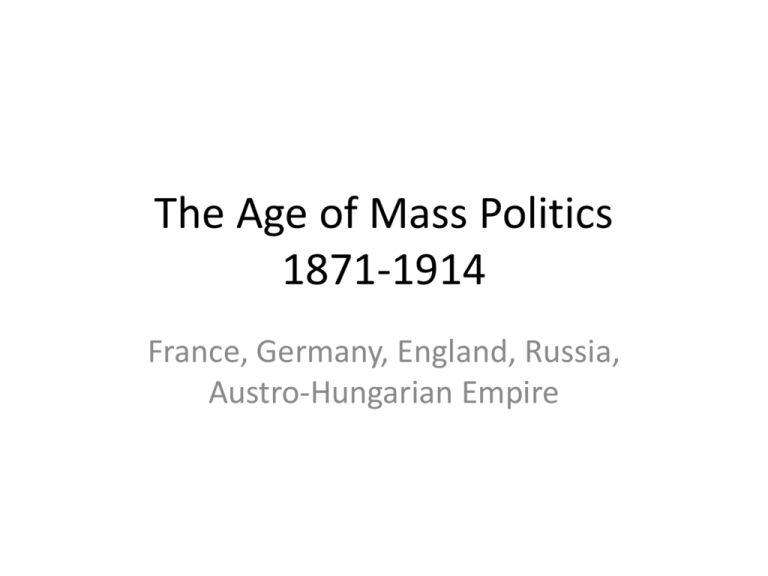
The Age of Mass Politics 1871-1914 France, Germany, England, Russia, Austro-Hungarian Empire Austro-Hungarian Empire • Ausgleich (Compromise) • Hungarians had own government – 25% wealthiest had right to vote • Austria assimilated Magyars – Language a sticky issue (German or Czech) – 1907 universal male suffrage (Austria) – Anti-Semitism France Third Republic • • • • • • Paris Commune Adolphe Thiers Weak president Chamber of Deputies had most power (elected) Trade Unions legalized Secular education & reform; tax supported schools, compulsory education • Multiparty system • Shifting coalitions Problems for the Third Republic • Boulanger Crisis – Leader gained support of military – Attempted coup, failed – Fled, killed himself • Panama scandal – De Lesseps – Corrupt, millions of dollars Dreyfus Affair • • • • 1894 Jewish Captain Emile Zola: J’accuse Alliance between moderate republicans and socialists • Conservatives and Catholic Church discredited • Socialists gain seats • Anti-Catholic movement Anti Semitism • Dreyfus Affair • Pogroms • Zionist Movement – Theodore Hertzel – The Jewish State – Father of Zionism Victorian England • Tory Party=Conservative Party=Benjamin Disraeli • Whig Party=Liberal Party=William Gladstone Conservative Party=Benjamin Disraeli • • • • Aggressive foreign policy Expansion of the British Empire Sympathy for the working class Reform Bill of 1867 – House of Commons, redistributed seats, more representation – Rotten boroughs lost seats – Almost all men over 21 right to vote – Doubled the number of men Liberal Party=William Gladstone • Liberal • Supported Irish Home Rule, fiscal policy, free trade, extension of democracy and against Imperialism • Abolished taxes to support Church of England • Secret ballot • Civil service reform, competitive examinations Liberal Party=William Gladstone • Reform Act of 1884 – Suffrage to adult males in the counties on the same basis as in the boroughs – 2 million agricultural voters added – Close to universal male suffrage New Groups Emerge • Women’s suffrage • Fabian Society – Advanced a form of revisionist Marxism – Political democracy and economic socialism • Independent Labor Party – Keir Hardie – Third political party – Trade unionists, socialists Liberal Party • 1905-1920’s • Aggressive social & economic programs • Foundations of social welfare state – Guaranteed standard of living – Unions right to strike – Workers compensation – Unemployment insurance & old age pensions – Mandatory school – Taxes increased on wealthy Liberal Party • Parliament Act 1911 – Eliminated power of House of Lords – 5 year Parliament term • Representation of the People Act 1918 – Women of 30 vote – All men, no property qualifications Women’s Rights & Suffrage • Started with divorce, marriage, and property laws • Needed suffrage to change anything • Suffragettes came from the middle class – Had time, education – Working class & socialists worked separately Women’s Rights & Suffrage • Millicent Garrett Fawcett – National Union of Women’s Suffrage Societies (NUWSS) – Demanded Parliament give vote • Emmeline Pankhurst – Militant – Finland 1906, Norway 1913 – Women’s Social and Political Union (WSPU) Emmeline Pankhurst • Destroyed: – RR stations – Art works – Store windows – Chained themselves to Parliament building – Hunger strikes – Emily Davison Women’s Rights & Suffrage • Representation of the People Act 1918 • Reform Act of 1928 – Women over 21 The Irish Question • Young Ireland (Nationalism 1848) • Gladstone: in favor of home rule • Ulster – Protestant counties in Northern Ireland • Irish Home Rule Act: didn’t pass House of Lords • Easter Rebellion (1916) • 1922, Ireland gained independence, N.Ireland remained part of British Empire The Eastern Question • Ottoman Empire – “The Sick Man of Europe” – Russia and A-H wanted territory • Pan-Slavism – Unite all Slavs under Russia – Russo-Turkish War – jingoism • Congress of Berlin (1878) – Russia gained little – Romania, Serbia, Montenegro independent Socialist Movements • • • • • • • Advance the proletariat Nationalism as a tool by ruling class Opposed war Marxism lead the way Socialist united=First International Huge growth: Germany, France, Belgium,A-H 1883, exiled from Russia (Lennin), Switzerland Revisionism • • • • Elections instead of Revolutions Standard of living up Labor unions grew Bread and butter issues: wages, hours, working conditions • Collective bargaining • EDUARD BERNSTEIN – Evolutionary Socialism – Proved Marx false Germany: Social Democratic Party (S.P.D) • • • • Marxist Sweeping social change Demilitarization of Germany Bismarck gives in to demands – – – – – – Protective tariff Modern social security National sickness & accident insurance Old age pensions, retirement benefits Regulated child labor Improved working conditions Socialists Elsewhere • Jean Jaures-France, gained seats in Chamber of Deputies • England- Fabian Society, political democrarcy & economic socialism, Labor Party, foundations of social welfare state Anarchy • • • • • Spun off from mainstream socialists Destroy the centralized state Mikhail Bakunin Strongest in Spain & Italy Political assassinations: 6 leaders in 20 years – Alexander II – King Umbro (Italy) – President William McKinley Russia • Crimean War defeat turning point • Lacked middle class to push for reform Alexander II (1855-1881) • Emancipation Act 1861: freed the serfs • Mirs: most Russians lived in Communes, collective ownership, hard to leave • Zemstvos: assemblies that adminstered local areas, popular participation, lords controlled them • Censorship relaxed • Education liberalized Alexander II (1855-1881) • Industrialization – – – – Railroads Industrial suburbs Factory working class Strengthened military • Critics – Realism replaced Romanticism – Intelligensia – Nihilism: believed in only science, had to rebuild society • 1881 Assassinated Count S.Y. Witte • • • • • • Industrialization of Russia Western capital Trans Siberian Railway Gold standard 4th in steel production Spread of Marxist thought Russia Problems • • • • 1/3 of farmland not used Population explosion Depression 1899 Russo-Japanese War 1905 Alexander III (1881-1894) • • • • Reactionary Autocracy, Orthodoxy, and Russification Anti Semitism, pogroms Theodore Herzel: Zionism, Jewish homeland Nicholas II (1894-1917) • Russo-Japanese War – Russia had Manchuria wanted Korea – Russia lost 1905 Revolution • • • • Peasants and middle class demand change “Bloody Sunday”: Jan.1905 General strike, peasant revolt, troop mutinies October Manifesto – – – – Duma created Freedom of speech, assembly, press Czar had absolute veto Revolutionaries divided in Duma • Mild economic recovery • Peter Stolypin: agrarian reform, encouraged free enterprise • Gregorii Rasputin: doubt about the Czar increased
